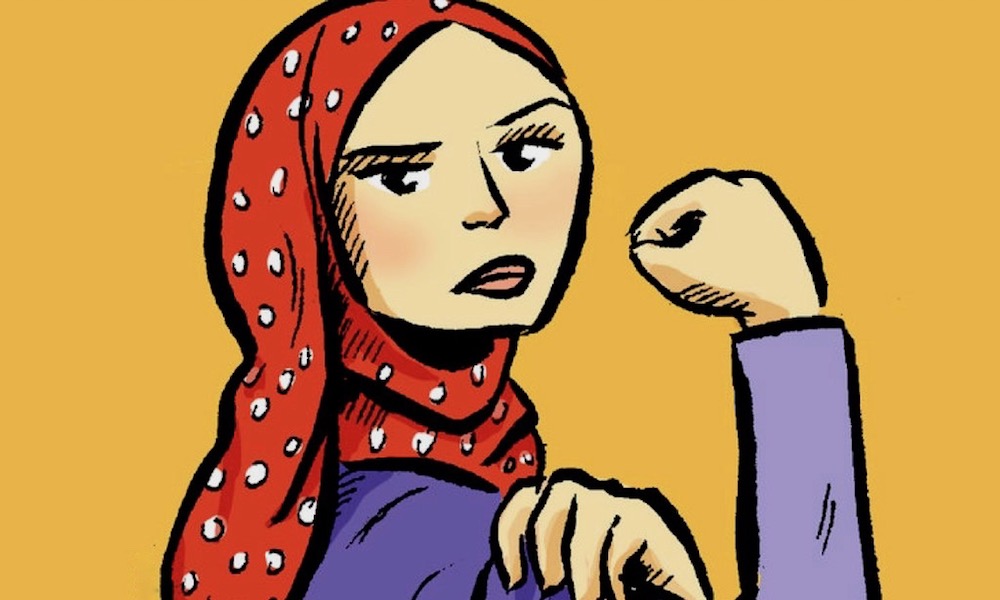What does it feel like to wear long clothing, flat shoes, no makeup and cover your hair every day?
“Empowering,” says Lauren Shields, author of “The Beauty Suit: How My Year of Religious Modesty Made Me a Better Feminist.” Her book, which came out earlier this year, chronicles her experience wearing a headscarf, long clothing, flat shoes and no makeup for the better part of a year.
I sat down with Shields for an interview, intrigued with by experiment and the idea that modesty could be a feminist vehicle for female empowerment.
How did you get the idea to do this experiment?
We had a woman come in to one of my classes at the seminary and talk to us about the hijab, the Islamic head covering. She said, “Most American Muslim women choose to cover [their hair]. They choose it. They’re not forced to do it by their husbands or their fathers or brothers.”
Covering is actually really liberating for some women. Like, “I am not being judged for my beauty—you need to react to me based on what I say and what I think. Not based on whether my makeup is current or perfect or whatever.”
At that moment, I looked down at my body. I was wearing restrictive clothes, makeup and my hair had all the goo in it and everything. I just went, “You know, I thought all these women were really oppressed and I was really liberated but I feel like I have to wear this stuff every time I leave the house.” Then, I decided to do the modesty experiment.
What were you hoping to gain?
I was hoping to loosen the “beauty suit” from my sense of self. How often do you see exposed women and naked women with the hashtag “liberated” or “empowered” or “strong”? That tends to be how modern feminist interpretations contrive liberation. It’s equated to less clothes or “hotness.”
Did men treat you differently?
They kind of avoided eye contact. They stayed way far away, like way far. They didn’t put their hands on me. I was like, “Okay thank you for giving me my space, finally.” But also, it screwed up my self-esteem. The little negative voice inside my head was like, “See, you never were attractive. You’ve never been beautiful. It was just the way you presented yourself.”
I came to realize that the beauty suit is a kind of availability sign. Like, I’m participating in popular culture and a lot of popular culture revolves around making men comfortable. If you are signaling that you are participating in that culture it’s like, “Oh you’re willing to help me manage my comfort. You are willing to be responsive in certain ways.” After 2 months I was like, “This is great, this is amazing. I don’t have to talk to dudes I don’t feel like talking to, no one is in my space.”
Did women treat you differently?
I definitely was glared at by a lot of women. Often behind my back. I’d be waiting by the bus and I’d see them just staring at me like, “What’s she doing?”
American mainstream culture always sees covering as oppressive rather than feminist. So every woman who chooses to cover for religious reasons is looked down on by women who think they’re more liberated. Like, “Oh that poor woman—she just doesn’t know any better.” It’s like, “Screw you, yes I do! It’s a choice that I’m making and who are you to decide for me what I should be doing?”
Did it change how you dress now?
Yeah! The experiment was in 2011 and I go out without makeup all the time now. When I do wear makeup, I don’t wear very much. I am not comfortable with a lot of exposure anymore. It’s not that I feel shamed, but the attention I get when I am exposed no longer feels good to me. I don’t like shopping anymore as much because what I see is I’m being lied to spend money. I don’t want to seem self-righteous like, “Oh, I’m beyond caring how I look,” but once you’ve figured out that participation in mainstream beauty culture is not as empowering as you thought it’s like, “Shoot what do I do with that freedom of self?”





